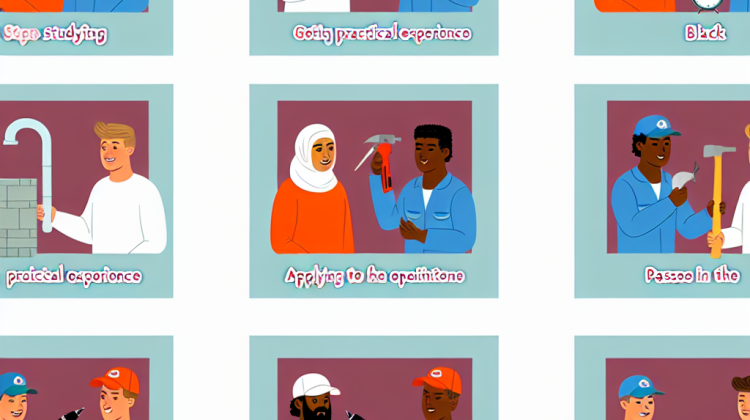
Did you know that plumbing is considered one of the oldest trades in the world? That’s right! Back in ancient times, the Romans had plumbing systems that brought water into their homes. Today, having a plumbing license is super important for anyone wanting to legally fix pipes, install toilets, or unclog drains. This license shows that a plumber knows their stuff and can keep homes and businesses safe and running smoothly.
Getting a plumbing license isn’t just a walk in the park; it’s a journey filled with steps you have to climb. First, it usually starts with some training or work experience. Most states want you to work as an apprentice for a couple of years. This way, you learn the ropes from a licensed plumber. It’s like being a superhero sidekick! You get to see all the tricks of the trade, and you’ll be ready to tackle some really tricky jobs in no time.
After you’ve put in the time as an apprentice, you’ll need to hit the books for a bit. Many states require an exam that tests your knowledge about everything from pipe materials to safety codes. If you’re thinking, “Gee whiz, that sounds tough!” just remember that lots of people pass the test with a bit of studying. Plus, there are plenty of prep classes and study guides to help you get ready, so you don’t have to go it alone! It’s a bit like cramming for a big test; you just need to know the right stuff.
Once you score high enough on the exam, you’re almost there! But hang on, there’s still a little bit more to do. You’ll need to fill out an application for your license and pay a fee. It’s like getting your ticket to the big show! And you might need to show proof that you have insurance because safety is a big deal in plumbing. No one wants to deal with problems that could hurt them or others!
Now, many states also ask for background checks. They just want to make sure that you’re a trustworthy person before giving you that shiny license. It’s kind of like how schools check your grades before letting you into the next grade! After everything’s checked out, and your application is approved, congratulations—you’ll have your plumbing license! It’s a big deal that opens many doors for you in the plumbing world.
How to Obtain a Plumbing License
If you’re thinking about becoming a plumber, you’ll need a plumbing license. It might sound tricky at first, but don’t worry! Let’s break it down into easy steps.
Know Your State’s Requirements
First off, each state has its own rules about plumbing licenses. Some places need only a high school diploma, while others might ask for more education or training. You’ll want to check the rules in your state. You can usually find this info on your state’s licensing board website. It’ll give you the scoop on what you need to do.
Get Some Experience
Now, here’s the juicy part. Before you can get your license, you usually need experience. That’s right! Most states want you to do an apprenticeship. This means you’ll work with a licensed plumber. You’ll learn the ropes while getting paid. How cool is that? You’ll get to know about plumbing systems, tools, and fixing leaks! You could be the hero of your friend’s house someday!
Complete an Educational Program
While you’re gaining experience, look for a plumbing program at a trade school or community college. Some people think it’s just a bunch of boring classes, but you’ll actually learn a ton! This may include safety, codes, and even some hands-on skills. Plus, it’s a great way to make connections in the field.
Take the Exam
Once you’ve got enough experience and education, it’s time for the big test! Most states will ask you to pass a plumbing exam. Don’t sweat it too much! The exam usually covers codes, safety rules, and other important stuff you learned in school and on the job. Make sure to study before sitting down for the test!
Apply for Your License
After you pass that exam, you’re almost there! Now, you need to apply for your license. You’ll fill out an application form, send your test results, and maybe even pay a fee. It’s like a little party for all your hard work! Just keep an eye on deadlines, so you don’t miss out.
Stay Updated with Continuing Education
Guess what? Once you have your license, you still need to keep learning! Many states require plumbers to take continuing education classes to keep their licenses. It’s a way to stay on top of new plumbing technologies and codes. Think of it as leveling up your skills!
- Check your state’s requirements regularly.
- Network with other plumbers and tradespeople.
- Look for new courses in plumbing technology and safety.
Remember, plumbing isn’t just about fixing sinks and toilets. It’s a skilled trade that people rely on every single day. A fun fact for you: According to the U.S. Bureau of Labor Statistics, employment for plumbers is expected to grow 5% from 2020 to 2030. So, there’s a lot of work out there just waiting for you!
“`html
How to Obtain Plumbing License FAQ
What is a plumbing license?
A plumbing license is a special piece of paper that says you can work as a plumber. It shows that you know how to fix pipes and work with water safely and properly.
Why do I need a plumbing license?
You need a plumbing license to make sure you can do the job right. It keeps people safe and helps everyone trust that you’re qualified to fix their plumbing problems.
How do I get started on getting a plumbing license?
First, you usually need to take some classes. These classes teach you the basics about plumbing. After that, you’ll often work as an apprentice, which means you learn from an experienced plumber.
What are the requirements to get a plumbing license?
- You need to be at least 18 years old.
- Complete a certain amount of trade school or training.
- Work as an apprentice for a specific number of hours.
- Pass a test about plumbing rules and safety.
How long does it take to obtain a plumbing license?
Getting a plumbing license can take a few months to a couple of years. It really depends on how much training you get and how long your apprenticeship lasts.
What kind of test do I have to take?
You’ll usually take a written test that covers plumbing codes, safety rules, and practical skills. Some places might also have a hands-on test where you show what you can do.
Do I need to renew my plumbing license?
Yes, most plumbing licenses need to be renewed every few years. You might have to take more classes or pass another test to keep your license active.
Can I work without a plumbing license?
Nope! Working without a plumbing license can get you in big trouble. It’s important to have that license to make sure you and everyone else stay safe.
Can I get a plumbing license online?
Some parts of the training can be done online, but most places need you to do hands-on training too. So, it’s best to check with your local plumbing board.
Where can I find more information about plumbing licenses?
You can find more info by checking your state’s plumbing board website. They usually have everything you need to know about getting your plumbing license!
“`
Conclusion
To get a plumbing license, you first need to check your state’s rules. Every state has different steps, so make sure you know what you’re getting into! Usually, you’ll need to complete some training. This might be through an apprenticeship or a technical school. It helps you learn the ropes and get hands-on experience, which is super important. After that, you’ll often need to pass a test that covers all the plumbing knowledge you’ve picked up.
Don’t forget to gather any needed documents and pay any fees, too! Once everything’s done and dusted, you can officially apply for your license. Keeping your license active is just as crucial, so remember to renew it when needed. There might be more tests or courses involved, depending on where you live, so stay on your toes! Following these steps will get you well on your way to becoming a licensed plumber, ready to tackle any plumbing challenge that comes your way. Good luck, and happy plumbing!
